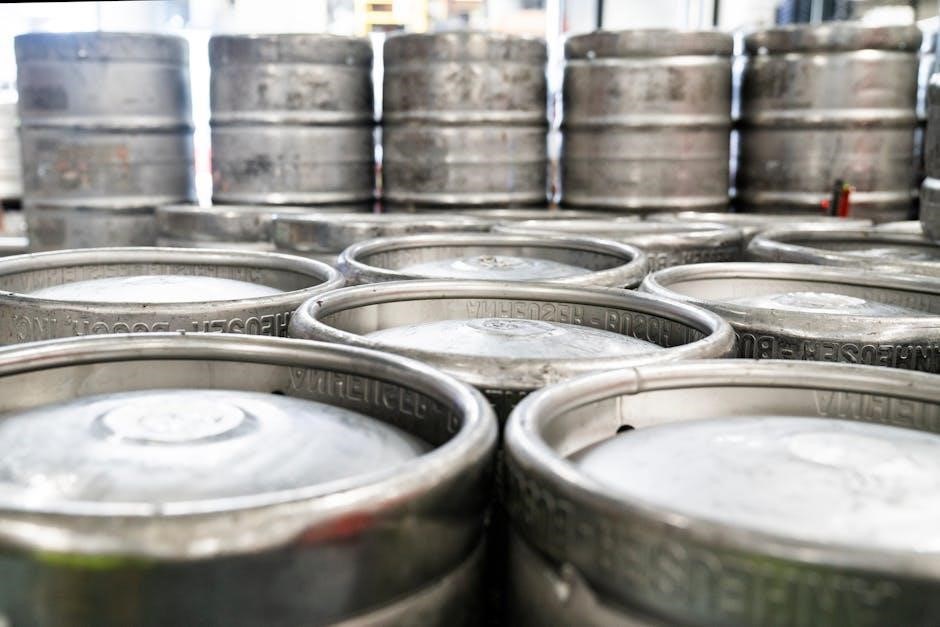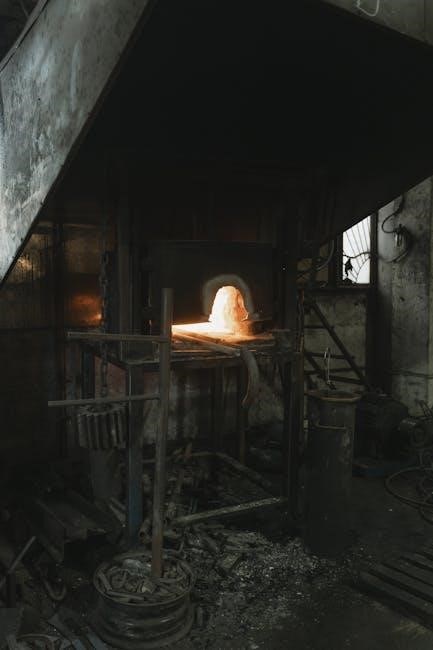Understanding the principles of stress, strain, and material strength is crucial in beer production. It ensures the safety, consistency, and efficiency of brewing equipment and processes, optimizing material performance.
1.1. Understanding the Basics of Mechanics of Materials
Mechanics of materials involves studying how forces affect the deformation and failure of materials. Key concepts include stress, strain, and material properties like elasticity and plasticity. In beer production, understanding these principles helps design durable equipment, such as tanks and piping, ensuring they withstand operational loads without failure. For example, compressive forces can shorten a beer bottle, while shear stress occurs when cutting it, highlighting the importance of material behavior analysis in brewing applications.
1.2. Importance of Material Science in Brewing
Material science plays a vital role in brewing by ensuring equipment durability and preventing contamination. The right materials, like stainless steel or copper, resist corrosion and withstand harsh brewing environments. Proper material selection enhances heat transfer, maintains sanitation, and ensures the quality of beer. Understanding material properties is essential for designing efficient and safe brewing systems, directly impacting the consistency, safety, and sustainability of beer production processes.

Stress and Strain in Brewing Equipment
Stress and strain analysis ensures brewing equipment withstands mechanical forces like tension, compression, and torsion. This prevents failures, maintains safety, and preserves beer quality during production processes.
2.1. Tensile Strength of Brewery Tanks
Tensile strength is critical for brewery tanks, as it determines their ability to withstand stretching forces without failure. Stainless steel, commonly used in tanks, exhibits high tensile strength, resisting cracking under internal pressure. Proper material selection ensures tanks can handle the stresses of fermentation and storage, maintaining structural integrity and preventing ruptures that could compromise beer quality and safety.
2.2. Shear Stress in Beer Piping Systems
Shear stress in beer piping systems occurs due to fluid flow, causing deformation in pipes; High flow rates and pressure gradients increase shear stress, potentially leading to material failure. Proper material selection and pipe thickness are critical to mitigate this. For example, stainless steel pipes are often used due to their resistance to shear stress, ensuring reliable beer transfer and preventing system breakdowns during operation.
2.3. Torsion in Brewery Mixers
Torsion in brewery mixers arises from rotational forces applied to shafts and gears. This twisting effect can lead to material deformation and failure if not properly managed. High-torque mixers, used for blending ingredients, are particularly susceptible. Stainless steel and durable alloys are often chosen for their resistance to torsional stress, ensuring reliable operation and consistent beer quality during the mixing process.

Bending and Flexural Strength in Beer Production
Bending and flexural strength are critical in beer production, ensuring equipment like conveyors and storage tanks can withstand flexural loads without failure. This prevents operational disruptions and maintains product integrity.
3.1. Bending Analysis of Brewery Conveyors
Bending analysis is essential for evaluating the structural integrity of brewery conveyors under various loads. By calculating stress concentrations and deflections, engineers ensure conveyors withstand operational demands without failure. Proper material selection, such as stainless steel, and design considerations like support spans and cross-sectional geometry, are critical to maintain efficiency and safety in beer production processes. This analysis prevents mechanical failures, ensuring smooth operation and minimizing downtime in breweries.
3.2. Flexural Strength of Beer Casks
Flexural strength is critical for beer casks to endure bending forces during handling and storage. High-quality materials like wood or reinforced polymers are chosen for their flexural rigidity, ensuring minimal material deformation under load. Proper design and manufacturing techniques, such as tight barrel construction, enhance resistance to cracking and leakage. This ensures the structural integrity and longevity of casks, maintaining beer quality and preventing contamination or spoilage during transportation and aging processes.

Material Selection for Brewing Equipment
Selecting the right materials for brewing equipment is vital for durability, sanitation, and compatibility. Stainless steel and copper are popular choices due to their corrosion resistance and thermal conductivity, ensuring optimal brewing performance and longevity.
4.1. Stainless Steel in Brewery Tanks
Stainless steel is widely used in brewery tanks due to its exceptional corrosion resistance, durability, and ease of cleaning. Its non-reactive properties ensure beer quality by preventing contamination and flavor alteration. High strength and resistance to temperature variations make it ideal for fermentation and storage vessels. Additionally, stainless steel’s smooth surface reduces the risk of bacterial growth, aligning with stringent food safety standards. Its longevity and cost-effectiveness further enhance its popularity in modern breweries.
4.2. Copper in Traditional Brewing Equipment
Copper has been a traditional material in brewing due to its excellent heat conductivity and aesthetic appeal. It is often used in brewhouses for heat exchangers and kettles, enhancing thermal efficiency. Copper’s ability to transfer heat evenly ensures consistent brewing temperatures, which is critical for beer quality. However, it requires regular maintenance to prevent oxidation and bacterial growth, and modern breweries sometimes line copper surfaces with non-reactive materials to avoid contamination and extend lifespan.

Pressure and Pressure Vessels in Brewing
Pressure vessels in brewing are critical for processes like fermentation and carbonation. They must withstand internal pressures while maintaining structural integrity to ensure safe and consistent beer production.
5.1. Pressure Analysis in Fermentation Tanks
Pressure analysis in fermentation tanks is vital to ensure safe and efficient beer production. Tanks must withstand internal pressures from carbonation and fermentation processes. Proper design and material selection are crucial to prevent structural failure. Understanding pressure distribution helps optimize tank geometry and material strength, ensuring durability and safety during brewing cycles. This analysis also minimizes risks of pressure-related failures, maintaining consistent beer quality and operational efficiency.
5.2. Stress Concentrations in Pressure Vessels
Stress concentrations in pressure vessels occur at points like welds, joints, and sudden changes in geometry. These concentrations can lead to material fatigue and failure if not addressed. Regular inspections and non-destructive testing are essential to identify and mitigate these risks. Understanding stress concentrations ensures the structural integrity of brewing equipment, preventing catastrophic failures and maintaining the safety and efficiency of the brewing process. Proper design and material selection are critical to minimizing these risks.

Fatigue and Fracture Mechanics in Brewing Machinery
Understanding fatigue and fracture mechanics is vital for brewery operations. Repeated stress causes material failure, affecting safety, efficiency, and equipment longevity. Monitoring is essential.
6.1. Fatigue Failure in Brewery Pumps
Fatigue failure in brewery pumps occurs due to repeated stress cycles from continuous operation. Over time, this leads to material degradation and eventual failure. Factors like fluctuating pressure, improper design, and inadequate maintenance exacerbate the issue. Regular inspections and material selection are critical to prevent premature failure, ensuring safety and efficiency in brewing operations. Addressing fatigue early reduces downtime and maintains production consistency.
6.2. Fracture Analysis of Brewery Valves
Fracture analysis of brewery valves focuses on identifying material failures caused by stress concentrations, corrosion, or improper design. Repeated pressure fluctuations and cyclic loading can lead to cracks, compromising valve integrity. Advanced testing methods, such as ultrasonic inspections, help detect early signs of fracture. Selecting durable materials and maintaining valves regularly are essential to prevent failures, ensuring safe and efficient beer production processes without downtime or contamination risks.

Thermal Stresses in Beer Production
Thermal stresses arise from temperature changes in brewing equipment, affecting material integrity. Managing heat transfer and expansion is critical to prevent damage and ensure optimal beer production processes.
7.1. Thermal Expansion in Brewery Piping
Thermal expansion in brewery piping occurs due to temperature fluctuations during brewing processes. Proper material selection, such as stainless steel, is essential to accommodate expansion without causing damage. Improperly managed thermal expansion can lead to piping deformation, leaks, or ruptures, compromising beer quality and safety. Accurate design considerations, including expansion joints, are critical to mitigate these risks and ensure reliable operation in brewing systems.
7.2. Heat Transfer and Thermal Stress in Brew Kettles
Heat transfer in brew kettles is critical for achieving consistent brewing temperatures. Thermal stress arises from uneven heating, potentially causing material deformation or failure. Proper material selection, such as stainless steel or copper, ensures durability under thermal gradients. Design considerations, including insulation and controlled heating, minimize thermal stress and prevent damage. Efficient heat transfer and stress management are vital for maintaining beer quality and extending equipment lifespan in brewing operations.

Non-Destructive Testing in Brewing Equipment
Non-destructive testing ensures brewery equipment reliability without causing damage. Methods like ultrasonic and radiographic testing detect flaws, ensuring safety and consistency in beer production processes.
8.1. Ultrasonic Testing of Brewery Tanks
Ultrasonic testing is a non-destructive method used to evaluate brewery tanks for structural integrity. It detects flaws like cracks or weak spots without damaging the equipment. This technique ensures the tanks can withstand internal pressures and maintain sanitation. Regular ultrasonic testing prevents contamination risks and extends equipment lifespan, crucial for consistent beer quality and safety in production processes.
8.2. Radiographic Testing of Beer Piping
Radiographic testing uses X-rays or gamma rays to inspect internal structures of beer piping. This non-destructive method helps detect flaws like cracks, blockages, or corrosion without disassembling the system. It ensures piping integrity, preventing leakage or contamination. Regular radiographic testing maintains hygiene standards, guarantees consistent beer quality, and avoids costly repairs by identifying issues early in the brewing process.

Corrosion and Its Impact on Brewing Materials
Corrosion significantly impacts brewing materials due to acidic and caustic environments. It weakens equipment, affecting beer quality and safety. Regular maintenance and resistant materials are essential to prevent degradation and ensure consistent production.
9.1. Corrosion Prevention in Brewery Equipment
Effective corrosion prevention in breweries involves using coating materials, stainless steel, and cathodic protection. These methods protect equipment from acidic and caustic environments, ensuring longevity and hygiene. Regular inspections and cleaning also play a role in preventing material degradation, which is critical for maintaining beer quality and safety. Implementing these strategies helps breweries avoid costly repairs and downtime while ensuring consistent production standards and equipment reliability over time.
9.2. Material Degradation in Brewing Environments
Material degradation in breweries occurs due to exposure to acidic and caustic environments, temperature fluctuations, and mechanical stress. Factors like hop acids, yeast byproducts, and cleaning agents accelerate wear on metals and polymers. Over time, this leads to pitting, cracking, or corrosion, compromising equipment integrity. Understanding these interactions is vital for selecting durable materials and maintaining optimal brewing conditions, ensuring both equipment longevity and consistent beer quality.
Ergonomics and Material Handling in Breweries
Ergonomics and material handling in breweries focus on optimizing workflows to enhance safety and efficiency. Proper lifting techniques and equipment design minimize injuries and improve productivity.
10.1. Safe Material Handling Practices
Safe material handling practices are essential in breweries to prevent injuries and equipment damage. Proper lifting techniques, use of mechanical aids, and training programs minimize risks. Ensuring clear pathways, labeling heavy objects, and using personal protective equipment further enhance safety. Regular audits and employee training foster a culture of safety, reducing incidents and improving overall operational efficiency in the brewery environment.
10.2. Ergonomic Design of Brewery Workstations
Ergonomic design in breweries focuses on optimizing workstations to reduce physical strain and improve efficiency. Proper layout of equipment and tools minimizes repetitive motions and lifting. Adjustable tables, machinery, and seating can enhance comfort and productivity. Good lighting and workflow organization further contribute to a safe and efficient working environment, reducing the risk of injuries and improving overall job satisfaction among brewery staff.
Sustainability in Brewery Material Selection
Breweries are increasingly adopting sustainable practices by using eco-friendly materials and recycling resources. This approach reduces environmental impact while maintaining efficiency in beer production processes.
11.1. Eco-Friendly Materials in Brewing
Breweries are embracing eco-friendly materials to minimize environmental impact. Stainless steel and recyclable plastics are popular choices due to their durability and sustainability. Additionally, some breweries now use bamboo for packaging and plant-based polymers for bottling. These materials not only reduce carbon footprints but also align with consumer demands for greener products. Sustainable practices in material selection are becoming a cornerstone of modern brewing operations.
11.2. Recycling and Reuse of Brewery Materials
Breweries are increasingly adopting recycling and reuse practices to enhance sustainability. Stainless steel tanks and plastic packaging are often recycled, reducing waste and resource consumption. Additionally, spent grains and hops are repurposed as animal feed or compost. Water recycling systems are also implemented to minimize environmental impact. These practices not only support eco-friendly brewing but also contribute to a circular economy, promoting resource efficiency and reducing landfill waste.
Case Studies in Brewery Material Failures
Examining real-world examples of material failures in breweries, such as tank ruptures or pipe leaks, provides insights into stress-induced failures and their impact on production and safety.
12.1. Analysis of a Brewery Tank Failure
A brewery tank failure often stems from material defects, improper stress distribution, or corrosion. Analysis involves reviewing design specifications, operating conditions, and material properties. Techniques like ultrasonic testing and metallurgical examination help identify failure origins. Understanding the root cause is crucial for preventing future incidents, ensuring safety, and maintaining production efficiency. Such failures highlight the importance of regular inspections and adherence to material strength standards in brewing equipment.
12.2. Lessons Learned from Brewery Equipment Failures
Analyzing brewery equipment failures reveals critical insights into material limitations and design flaws. These incidents highlight the importance of regular maintenance, improved material selection, and adherence to safety standards. Implementing corrective measures, such as enhanced stress analysis and material testing, can prevent future failures. Lessons learned also emphasize the need for robust quality control and collaborative efforts across the industry to share best practices and innovations.

Future Trends in Brewing Materials and Mechanics
The integration of sustainable materials and advanced manufacturing techniques is reshaping the brewing industry. Innovations in material science promise improved efficiency, durability, and eco-friendliness in beer production processes.
13.1. Emerging Materials in Beer Production
The brewing industry is embracing innovative materials like lightweight composites, sustainable polymers, and corrosion-resistant alloys. These materials enhance durability, reduce environmental impact, and improve thermal efficiency in brewing systems. Advances in eco-friendly alternatives, such as bamboo-based components and recycled metals, are gaining traction, offering cost-effective solutions while maintaining performance standards. Such innovations are pivotal in modernizing beer production and aligning with global sustainability goals.
13.2. Advanced Manufacturing Techniques in Brewing Equipment
Modern brewing leverages advanced manufacturing techniques such as 3D printing, CNC machining, and laser welding to produce precise, durable equipment. These methods enable the creation of complex designs, reducing material waste and improving efficiency. Automation and robotics are also being integrated to streamline production, ensuring consistency and scalability. Such innovations enhance the reliability and performance of brewing systems, contributing to the industry’s growth and adaptability in meeting demand.
Understanding the mechanics of materials is vital for optimizing beer production, ensuring equipment safety, and maintaining consistency. This field bridges engineering and brewing, fostering innovation and sustainability.
14.1. Summary of Key Concepts
The mechanics of materials in beer production involves understanding stress, strain, and material strength to ensure equipment safety and efficiency. Key concepts include analyzing tensile strength, shear stress, and thermal expansion in brewery equipment. Material selection, such as stainless steel and copper, plays a critical role in withstanding brewing conditions. Additionally, non-destructive testing and corrosion prevention are essential for maintaining equipment integrity. These principles collectively ensure consistent beer quality, operational safety, and long-term sustainability in brewing processes.
